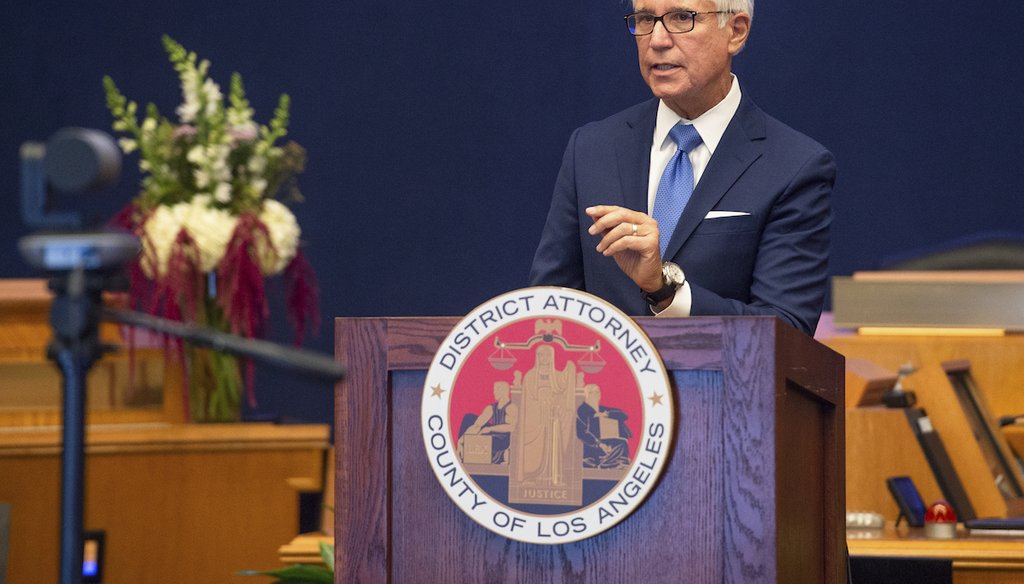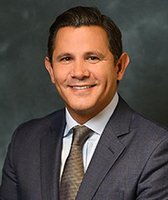Get PolitiFact in your inbox.

In this Dec. 7, 2020, file photo provided by the County of Los Angeles, George Gascón speaks after he was sworn in as Los Angeles district attorney in Los Angeles. (AP)
If Your Time is short
-
An effort to put a question on a ballot to recall Los Angeles District Attorney George Gascón failed because proponents fell short on collecting petition signatures.
-
The county rejected about 30% of the signatures the recall campaign collected. They said the signers were not registered voters, signed more than once or lived at an address different from the one on file.
-
In 2020, slightly less than 1% of mail ballots in California were rejected. The main reasons for rejection were that the voters’ signatures did not match the ones on file, the signatures were missing or the ballots arrived after deadline.
Los Angeles voters will not decide whether to recall Los Angeles District Attorney George Gascón in November because recall supporters didn’t collect enough valid signatures to put a question on the ballot.
The failed recall effort has fueled a misleading comparison between rejected general election mail-in ballots in California 2020 and rejected signatures on the recall petition in Los Angeles County.
An Instagram post said California rejected less than 1% of mail ballots during the 2020 general election while the national rejection rate was 0.08% (the author likely meant 0.8%). "However, when verifying signatures to remove far-left LA District Attorney George Gascón, 30% were rejected. Wake up people."
Donald Trump Jr. and Fox News host Tucker Carlson also made similar comparisons to mail ballot and recall rejections.
"Thirty percent were invalid?" Carlson said. "But they're telling us that mail-in balloting, which is a huge percentage of votes in our elections, is totally fraud-free, and they're all valid. How does that work?"
Some numbers the post cites are accurate in isolation. But these rejection rates are based on different types of documents with different reasons for being rejected.
The Instagram post was flagged as part of Facebook’s efforts to combat false news and misinformation on its News Feed. (Read more about our partnership with Facebook.)
Voters elected Gascón in November 2020 after he vowed to change the criminal justice system. After he won, he promised his office would no longer seek the death penalty, charge juveniles as adults or seek what prosecutors call "enhancements" to obtain longer prison sentences.
Gascón is part of a national movement of prosecutors who are calling to change tough-on-crime policies that have driven prison costs higher. Amid an increase in some crimes including homicides, his opponents sought to end his four-year term early through a recall. They failed.
For mail-in ballots to count in California, voters must sign ballot envelopes before returning them. Local election officials must then verify the signatures on the envelopes by checking them against the voters’ signatures from registration records. In 2020, slightly less than 1% of mail ballots were rejected statewide, including in Los Angeles County. The most common reasons for mail ballot rejection were:
-
The voters’ signatures did not match the ones on file;
-
The ballots weren’t received on time;
-
The voters’ signatures were missing.
California’s mail ballot rejection rate was similar to the national average, which was around 0.8%.
California law for petitions also requires county officials to cross-check recall signatures against the signatures on voters’ registration records.
Los Angeles County’s recorder-registrar said Aug. 15 that it examined nearly 716,000 petition signatures and found that about 196,000 were invalid, or about 27%, close to the number in the Instagram post. The petition drive fell about 47,000 signatures short of qualifying for the ballot.
The most common reasons for petition signature rejections were that the signers:
-
Were not registered voters;
-
Signed more than once;
-
Provided addresses different from the ones on file.
By some metrics, it's impossible to compare the reasons for mail-in ballot and petition drive signature rejections. For example, although a missing signature is a top reason for rejecting mail ballots, there is no such thing as missing signatures on petitions.
On the petition drive, the number of rejected signatures because of a signature mismatch was 9,490, which represents about 1% of the petition signatures.
Joshua Spivak, who wrote a book about recalls, wrote in The Recall Elections Blog that "the signature rejection rate was within the range of past California recalls, though on the higher end." In July, he examined previous recall petition drives in California and predicted that officials would reject about 20% of the signatures.
"The reasons are usually mundane, which is what happens when you’re collecting signatures on the street and frequently paying people to collect," Spivak wrote.
Spivak said people who gather signatures on petitions aim to collect far more than they need because they know the rejection rate is "usually significant."
After the effort to bring the recall to voters failed, Gascón tweeted that his focus will remain "keeping us safe & creating a more equitable justice system for all."
RELATED: Ask PolitiFact: How are elections run in the US?
RELATED: Much has changed since Jimmy Carter’s report on fraud in mail voting
Our Sources
David GiglioCA, Instagram post, Aug. 15, 2022
Donald Trump Jr., Tweet, Aug. 15, 2022
Fox News, Tucker Carlson Tonight transcript, Aug. 17, 2022
Los Angeles County Recorder-Registrar, Press release, Aug. 15, 2022
Los Angeles County District Attorney Office, Directives, Accessed Aug. 18, 2022
California Secretary of State, 2020 general election vote by mail acceptance and rejection statistics, Jan. 21, 2021
The Recall Elections Blog, California: Los Angeles District Attorney recall fails, with 28% signature rejection rate, Aug. 15, 2022
LA District Attorney George Gascón, Tweet, Aug. 15, 2022
AP, Posts misrepresent failed attempt to recall Los Angeles DA, Aug. 16, 2022
Elections Performance Index, A Deep Dive into Absentee Ballot Rejection in the 2020 General Election, Dec. 16, 2021
U.S. Census, Majority of Voters Used Nontraditional Methods to Cast Ballots in 2020, April 29, 2021
PolitiFact, Yes, California requires signature verification for mail-in ballots and Newsom recall petitions, Feb. 16, 2021
Email interview, Mike Sanchez, spokesperson for Los Angeles County Recorder-Registrar, Aug. 18, 2022
Telephone interview, Joshua Spivak, senior fellow at the Hugh L. Carey Institute for Government Reform at Wagner College and senior research fellow at Berkeley law’s California Constitution Center and author of book Recall Elections: From Alexander Hamilton to Gavin Newsom, Aug. 18, 2022




































